10th Apr, 2018 | gsadmin
(the following is an essay written by Senpai Dennis Goldsmith for his Ni Dan – or second degree black belt – exam in November of 2016)
Karate saved my life.
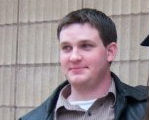
At 25 years old, I was overweight, out of shape, and harbored a crushing sense of self-loathing. During my ex-wife’s pregnancy and the first year of my beautiful daughter’s life I found plenty of reasons to eat and few opportunities to exercise. The lean, athletic body I had maintained since high school had disintegrated into a flabby, frustrating frame that was incapable of physical feats I previously found easy to accomplish. A single lap around the soccer field with my students left my lungs burning and my legs aching, and quite frankly, I was fed up with myself.
I tried the usual workout methods: running on a treadmill, lifting weights, riding an exercise bike while listening to excruciating pop music. I tried eating healthier, substituting the foods I loved – such as hamburgers – for things that I hated – such as not-hamburgers. I lost a couple of pounds here and there, but quickly gained them back whenever some well-meaning individual brought sweets to our school (or whenever I ate at my mom’s house). No doubt I had trouble with will power, but I also could not, for the life of me, find a method of exercise that didn’t bore me to death.
I had trained in Shotokan karate as a child for about four years, and I still vividly recall both the exhaustion and enjoyment that it brought. My sensei at the time, George Kent, was a relentless but excellent trainer – if not extremely terrifying. I began to search for a karate dojo that might do justice to the torment that I received as a child, and – lo and behold! I discovered that Sensei Kent’s dojo was still open in town, so I decided to try it out.
I remember nearly dying during my first class. After what must have been the one thousandth roundhouse kick that my comically inadequate body delivered to the punching bag, everything in me was screaming to give up and lie down. With each move I was convinced that the next would be my last, yet I kept at it. Just when I thought that I really had nothing left in me, Sensei yelled “Yame!” and it was time to end class.
The next morning I felt exactly as though I had been run over by a locomotive. My everything hurt – and it was an incredible feeling. After being nearly killed the night before, I felt more alive than I had been in years. I signed the waiver, gave Sensei a check, and began my martial arts training anew.
It all came back to me fairly quickly – the stances, movements, techniques, even some of the kata that I had learned as a child. I advanced in rank fairly quickly, going from a white belt to a green belt in about three month’s time (skipping yellow and orange belts, which came in between at this dojo). The training became a little easier on me physically as my body became more accustomed to physical activity, and I noticed a little improvement in my stamina. A few months after I achieved green belt, I was allowed to skip blue belt and received my purple belt. Now an intermediate going on advanced student, the training increased in intensity, and that is when the weight really started to melt off.
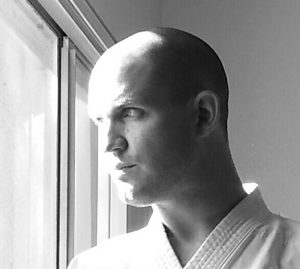
In about 8 months I had lost around 40 pounds, dropping from 205 to about 165lbs (at my lightest). I had also attained the rank of third kyu (first-degree brown belt), which was almost where I was when I quit training as a kid. I continued training in both karate and jiu-jitsu for about three more years, eventually making it to first kyu.
It wasn’t until after I reached first kyu that I competed in my first tournament as an adult. I entered the 2011 Western States Karate Championship in Phoenix, AZ fully expecting to be destroyed by more seasoned competitors. Watching the other competitors in the brown belt division, I knew it was going to be tough, and I prepared myself for a humbling experience. After competing in kata and not even placing, I was a bit dismayed (though not very surprised). I then stepped up to compete in kumite (sparring), a nervous wreck – there were three or for competitors that were very, very good, and I must admit that I was a bit intimidated.
My first opponent was defeated fairly easily, which helped my confidence a bit. My second opponent, however, towered over me and was extremely aggressive. The first hit he connected with felt like being kicked by a horse, and it became abundantly clear that this match would not go so easily as the first. After trading blows for two minutes, the match came to a draw and went into overtime. As the big guy came at me for the final round, I felt strangely calm and relaxed, waiting for his attack. True to form, he charged at me like a bull, and anticipating his strike, I blocked, evaded, and countered, winning the match.
My final opponent was a bit shorter than I, but his technique was much better than the big man’s, and he was incredibly quick. This match also went back and forth, and very nearly went into overtime again. At the last minute, however, he lunged forward with a jab to the face, but I connected with a reverse punch to the stomach a fraction of a second before he landed his strike. I won the match, was awarded first place and a gold medal, and went home with a black eye and one of the biggest smiles I’ve ever smiled.
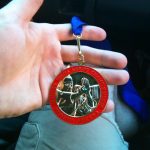
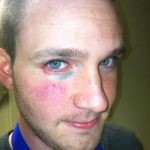
If I didn’t absolutely love karate before, all that changed after winning my first tournament. It was then that I really began to set my eyes on attaining the rank of black belt. No longer was this simply a means to become healthier – it had transcended into something much more meaningful, something that, from then on, would be ingrained within every aspect of my life. It then became as much a part of me as family, work, church, friendships, etc. It was a part of my identity.
I went on to compete in various other tournaments, and did quite well. I was given a key to the dojo and put in charge of the kids classes, as well as filling in for Sensei Kent when he was not able to make class (which, for reasons unknown to me at the time, increased in frequency as time went on). My physical condition reached an all-time high, and I was in the best shape of my life. When I was having a rough go at life, I went to the dojo. When I started having marital problems, I went to the dojo. When something exciting was happening, I went to the dojo. My place of training had become a kind of anchor in my life, something that I could count on to both ease my hurts and accentuate my joys.
It was about six months or so after my divorce that I received the news: Sensei Kent was very sick (we speculated that it was cancer, but I don’t think any of us ever really found out for sure). His attendance had declined dramatically in the past year, and due to health and financial reasons, he would have to close down the dojo. The students were all given about a month’s notice (Sensei Kent later passed away in November of 2016).
This was crushing news for me. Though there were a couple of other dojos in town, this was the only Shotokan school in the area, and the only traditional Japanese dojo in a hundred miles. I had been a first kyu for almost three years, and had been preparing to test for Sho Dan (first degree black belt) for quite some time, and now it seemed that that dream would have to be put on hold – indefinitely. Receiving this news shortly after the passing of my grandfather, who I was very close to, sent me into a brief but intense period of depression.
Fortunately, I did not have to endure the loss of my dojo for very long. My friend Chris Kottke, whom I trained with at Prescott Shotokan, had made contact with a seventh-degree black belt from Camarillo, California, who was planning on moving to Prescott after retirement. Chris arranged for a place for all of us to meet and train, and it was then that I met one of the most influential people that I have ever had the privilege of knowing: Sensei Victor Young.
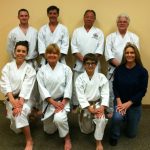
Sensei Young trained us with a mixture of kindness and incredibly high expectations, which we all found refreshing. I had learned more in the first few months of my training with Sensei Young than I had in a year spent at my previous dojo, and I once again rekindled the hope of becoming a black belt.
We named the dojo “Ganbare”, which roughly translates to “perseverance”, or “hang in there!”, which is about as fitting a name for our little group as I could have hoped for. Our training increased in both quality and intensity, and I felt more prepared than ever to be a successful martial artist. In October of 2014, I was finally given the opportunity to take my Sho Dan exam, and I passed! In the moment of elation that followed, I vowed to make karate a lifelong endeavor of mine, and to share this passion with as many people as possible.
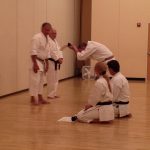
Receiving my black belt from Sensei Victor Young and Sensei David Hurlbut
It was not long after that that my friend Chris had to step down as manager and senpai of Ganbare dojo for health reasons. Surprisingly, he asked me to fill his shoes, which I accepted with equal parts enthusiasm and dread. I loved teaching others and helping them attain their goals, but had little to no experience with running a business. Despite my apprehensions, I took on the challenge, and have been managing the dojo since December of 2014, as well as teaching the youth classes.
It is now my long-term goal to continue training hard, advancing in rank, and become a sensei at Ganbare Shotokan of Prescott. My training in karate has ignited a passion within me that I hope to share with as many people as possible, for as long as I am physically able, and I am blessed to have such an opportunity. Karate saved my life – it would be selfish of me not to help others do the same.
“The ultimate aim of Karate lies not in victory or defeat, but in the perfection of the character of its participants.” – Master Gichin Funakoshi, Founder of Shotokan Karate-do